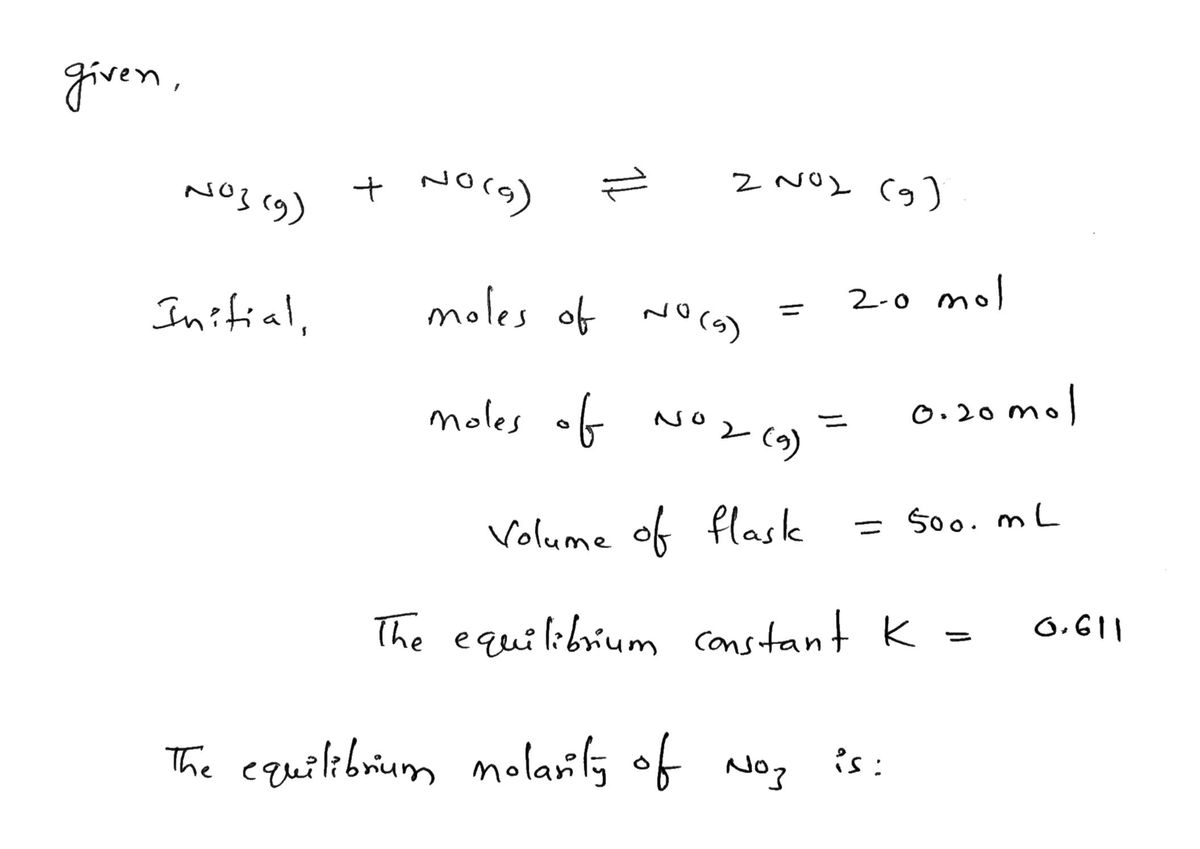Suppose a 500. mL flask is filled with 2.0 mol of NO and 0.20 mol of NO₂. The following reaction becomes possible: NO₂(g) + NO(g) 2NO₂(g) The equilibrium constant K for this reaction is 0.611 at the temperature of the flask. Calculate the equilibrium molarity of NO3. Round your answer to two decimal places. OM 2 X 5
Suppose a 500. mL flask is filled with 2.0 mol of NO and 0.20 mol of NO₂. The following reaction becomes possible: NO₂(g) + NO(g) 2NO₂(g) The equilibrium constant K for this reaction is 0.611 at the temperature of the flask. Calculate the equilibrium molarity of NO3. Round your answer to two decimal places. OM 2 X 5
Chemistry
10th Edition
ISBN:9781305957404
Author:Steven S. Zumdahl, Susan A. Zumdahl, Donald J. DeCoste
Publisher:Steven S. Zumdahl, Susan A. Zumdahl, Donald J. DeCoste
Chapter1: Chemical Foundations
Section: Chapter Questions
Problem 1RQ: Define and explain the differences between the following terms. a. law and theory b. theory and...
Related questions
Question
![Certainly! Below is a transcription of the text from the image, formatted as if it were to appear on an educational website.
---
### Kinetics and Equilibrium
**Calculating Equilibrium Composition from an Equilibrium Constant**
Suppose a 500 mL flask is filled with 2.0 mol of NO and 0.20 mol of NO₂. The following reaction becomes possible:
\[ \text{NO}_3 (g) + \text{NO} (g) \rightleftharpoons 2\text{NO}_2 (g) \]
The equilibrium constant \( K \) for this reaction is 0.611 at the temperature of the flask.
**Task:**
Calculate the equilibrium molarity of NO₃. Round your answer to two decimal places.
---
**Input Box:**
An input box is provided for you to enter your answer.
**Buttons Available:**
- **Explanation:** For reviewing the solution process or additional help.
- **Check:** To verify the entered response.
**Note:** Ensure you input your answer rounded to two decimal places.
---
This setup helps students understand the process of calculating equilibrium compositions using equilibrium constants in a controlled virtual environment.](/v2/_next/image?url=https%3A%2F%2Fcontent.bartleby.com%2Fqna-images%2Fquestion%2F9be9a090-f726-46c3-84a4-96616934014f%2F2ac0765c-d015-4c8b-8764-c336be7cf6a0%2Frcmxuce_processed.jpeg&w=3840&q=75)
Transcribed Image Text:Certainly! Below is a transcription of the text from the image, formatted as if it were to appear on an educational website.
---
### Kinetics and Equilibrium
**Calculating Equilibrium Composition from an Equilibrium Constant**
Suppose a 500 mL flask is filled with 2.0 mol of NO and 0.20 mol of NO₂. The following reaction becomes possible:
\[ \text{NO}_3 (g) + \text{NO} (g) \rightleftharpoons 2\text{NO}_2 (g) \]
The equilibrium constant \( K \) for this reaction is 0.611 at the temperature of the flask.
**Task:**
Calculate the equilibrium molarity of NO₃. Round your answer to two decimal places.
---
**Input Box:**
An input box is provided for you to enter your answer.
**Buttons Available:**
- **Explanation:** For reviewing the solution process or additional help.
- **Check:** To verify the entered response.
**Note:** Ensure you input your answer rounded to two decimal places.
---
This setup helps students understand the process of calculating equilibrium compositions using equilibrium constants in a controlled virtual environment.
Expert Solution
Step 1

Step by step
Solved in 3 steps with 3 images

Knowledge Booster
Learn more about
Need a deep-dive on the concept behind this application? Look no further. Learn more about this topic, chemistry and related others by exploring similar questions and additional content below.Recommended textbooks for you

Chemistry
Chemistry
ISBN:
9781305957404
Author:
Steven S. Zumdahl, Susan A. Zumdahl, Donald J. DeCoste
Publisher:
Cengage Learning

Chemistry
Chemistry
ISBN:
9781259911156
Author:
Raymond Chang Dr., Jason Overby Professor
Publisher:
McGraw-Hill Education

Principles of Instrumental Analysis
Chemistry
ISBN:
9781305577213
Author:
Douglas A. Skoog, F. James Holler, Stanley R. Crouch
Publisher:
Cengage Learning

Chemistry
Chemistry
ISBN:
9781305957404
Author:
Steven S. Zumdahl, Susan A. Zumdahl, Donald J. DeCoste
Publisher:
Cengage Learning

Chemistry
Chemistry
ISBN:
9781259911156
Author:
Raymond Chang Dr., Jason Overby Professor
Publisher:
McGraw-Hill Education

Principles of Instrumental Analysis
Chemistry
ISBN:
9781305577213
Author:
Douglas A. Skoog, F. James Holler, Stanley R. Crouch
Publisher:
Cengage Learning

Organic Chemistry
Chemistry
ISBN:
9780078021558
Author:
Janice Gorzynski Smith Dr.
Publisher:
McGraw-Hill Education

Chemistry: Principles and Reactions
Chemistry
ISBN:
9781305079373
Author:
William L. Masterton, Cecile N. Hurley
Publisher:
Cengage Learning

Elementary Principles of Chemical Processes, Bind…
Chemistry
ISBN:
9781118431221
Author:
Richard M. Felder, Ronald W. Rousseau, Lisa G. Bullard
Publisher:
WILEY